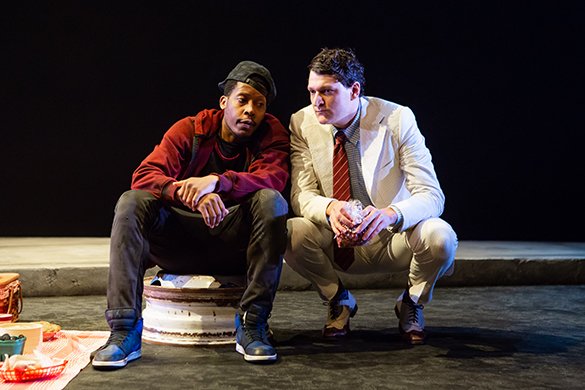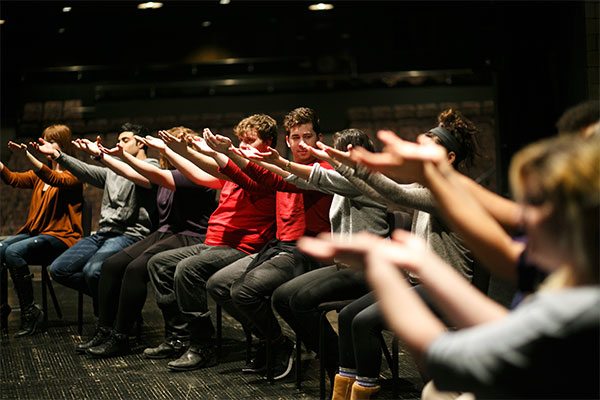by Brian Scott Lipton
One only has to watch the nightly TV news or read a newspaper to be aware of the plight of young black men in America being persecuted and even killed with alarming regularity by Caucasian policeman. While this unfortunate turn in American society can nonetheless feel far removed for many (especially in Manhattan), playwright Antoinette Nwandu forces us to face this phenomenon head on in “Pass Over,” her often gripping new play, now being presented at Lincoln Center Theater’s Claire Tow Theatre, under Danya Taymor’s astute direction.
Borrowing liberally from Samuel Beckett’s “Waiting for Godot,” Nwandu places her two main characters, the outwardly intense Moses (an extraordinary Jon Michael Hill) and the more sensitive, passive Kitch (the excellent Namir Smallwood) on a large, street-lamp-lit sidewalk (superbly designed by Wilson Chin). There, these two young, obviously unemployed young men pass the time (much like Vladimir and Estragon) engaging in repetitive, profanity-filled conversations and playing the occasionally “game” (as in naming the 10 things they most want). More importantly, they are always dreaming of moving on to a better life. Yet they are not necessarily waiting for God, but the inevitable nightly visit from the “po-po” (police), who may or may not put a bullet in their heads.
Watching these men wasting their life, as well as living it in daily fear, can’t help but be heartbreaking, even as Nwandu never gives specific reasons for their inertia. We do learn they were both schooled as young men in church, but learn little of what happened after that to cause them to remain so stuck in place. (The show has no specific place setting; while the times are listed as now, 1855 and the 13th century BCE, which clearly refer to the long history of oppression of black-skinned people.)
Although it takes a while, Nwandu eventually introduces two white characters to proceedings (both played brilliantly by Tony Award winner Gabriel Ebert); the first is a seemingly too-courtly, too-pleasant gentleman who claims to have lost his way going to his mother’s house (and who, no real spoiler, eventually reveals the malice behind his big smile much like the Big Bad Wolf) and one of the “po-pos,” a hulking, intimidating officer who (again, no real spoiler) derives his entire persona from his uniform and weapons. Both men are clearly there to make the audience (as well the guys) feel uncomfortable, but I do think it’s the one big flaw in Nwandu’s dramaturgy is that they feel far too much like plot devices, especially when she has so vividly drawn Moses and Kitch.
Given the discomfiting nature of the piece, many audiences will be tempted to pass on “Pass Over.” Indeed, it’s far from light summer entertainment, but sometimes one has to take off the sunglasses and stare directly into the light.
Pass Over continues at the Claire Tow Theatre (150 West 65th Street) through July 15. For tickets and information, visit www.lct.org.

























